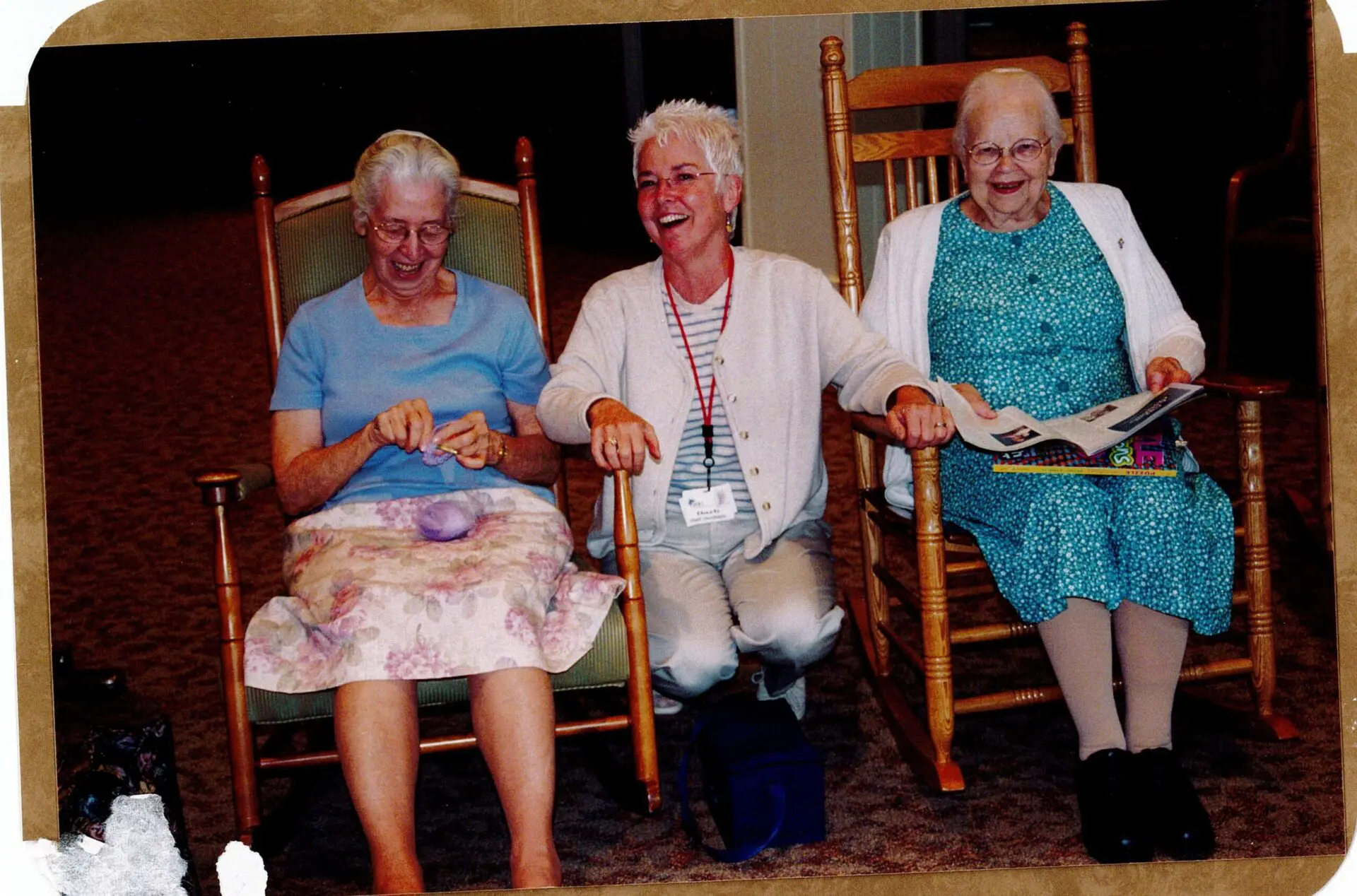Just a few years shy of its 50th anniversary, the Souderton Mennonite Homes Auxiliary reached an important milestone. Since its creation in 1975, the group has contributed $2 million to Souderton Mennonite Homes.
“I have such a wonderful group behind me,” said Auxiliary president Alta Yoder. “That’s why we keep plugging ahead with things – why we’re still raising money.”
For half a century, the Auxiliary has served the Souderton community through volunteering and, in recent years, a strong focus on fundraising for benevolent care.
“The Auxiliary has faithfully served countless Souderton Mennonite Homes residents and their families over the years,” said Living Branches President/CEO Edward Brubaker. “The group’s longevity is a testament to the clarity of their mission, dedication of their members, and nimbleness in meeting our community’s evolving needs.”
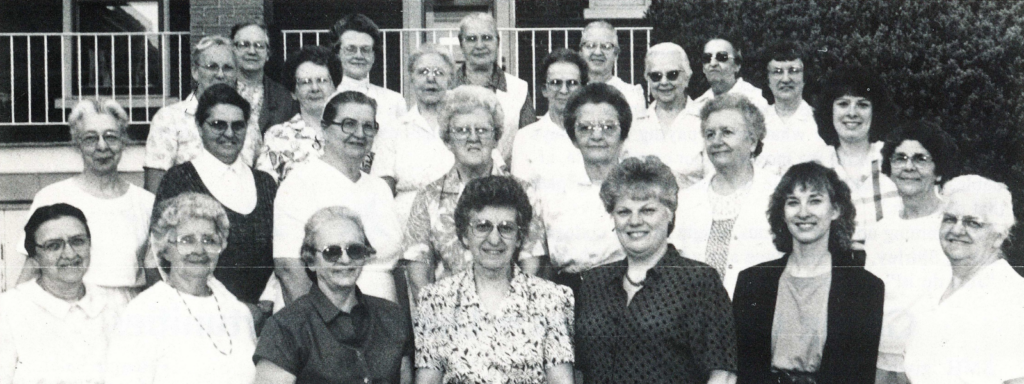
A Call to Service
The Auxiliary was born from a singular call to serve others. Marion Alderfer Landis, a registered nurse at Grand View Hospital and a dedicated volunteer at Souderton Mennonite Homes, formed the Auxiliary and served as its first president in 1975.
In that role, Marion oversaw Auxiliary operations, fundraising efforts, and volunteer recruitment and management.
“She just saw a need,” Alta said. “She and her husband had always visited residents, so they knew what was needed.”
Many Hands
Although she served with the Auxiliary until 1989, Marion quickly brought others into the fold. The presidency passed to Florence Metz in 1977 and was held by three others – Shirley Swartz, Esther Leatherman, and Anna Mae Derstine – before Alta took the role in 1986 and was hired by Souderton Mennonite Homes in 1988.
“Marion was a wonderful person to work with,” Alta said. “She was always supportive and stayed very involved even after I came on board.”
The Auxiliary coordinated volunteers, drawn from member churches, to support residents and team members in day-to-day activities. They also celebrated resident birthdays and hosted many socials and activities now managed by life enrichment coordinators. Popular events included a spring fling social, a summer picnic, and an annual Christmas celebration and tea.
Beloved Traditions
To raise funds for repairs, remodeling, and miscellaneous items such as a piano and projector, the Auxiliary got to work right away in its early years. Members displayed quilts in local banks, sold antique furniture, and hosted auctions.
As the Auxiliary grew throughout the late 1970s and early 1980s, the group launched many of the cherished fundraisers still enjoyed today at the Souderton campus of Living Branches.

The Chicken BBQ and Quilt Auction
Under the guidance of Florence Metz, the Auxiliary started in 1975 what would become a well-known annual event in the Souderton community: the Chicken BBQ and Quilt Auction.
“It was on a small scale early on,” Alta recalled, “and the main thing was the quilt auction as well as the chicken. We used to make our chicken on Christopher Dock’s campus and transport it up to Souderton until the Auxiliary installed the BBQ pit on the Souderton campus in 1987. Eventually, the event got to the size that we would hire a company to put all the tents up.”
Though the Covid pandemic and challenges with volunteer recruitment have brought a close to the chicken BBQ, some elements of the event, such as the hymn sing, are set to continue at Souderton Mennonite Homes.
“Like most non-profit organizations today, Living Branches is retooling its large fundraiser events,” said Keith Heavener, director of fund development for Living Branches. “Fortunately, the Auxiliary continues to find ways to raise funds in support of residents. Their creativity and agility is admirable.”
Grandma’s Old Fashioned Dinners
Starting in 2005, one of the items auctioned off at the Chicken BBQ was a dinner for 12, prepared and served by Auxiliary members in the Sunflower Room at Souderton Mennonite Homes. Cuisine varied over the years – from roast beef to oysters to ham to brunch – but the food and fellowship was always enjoyed by attendees and the Auxiliary volunteers who contributed home-cooked food.
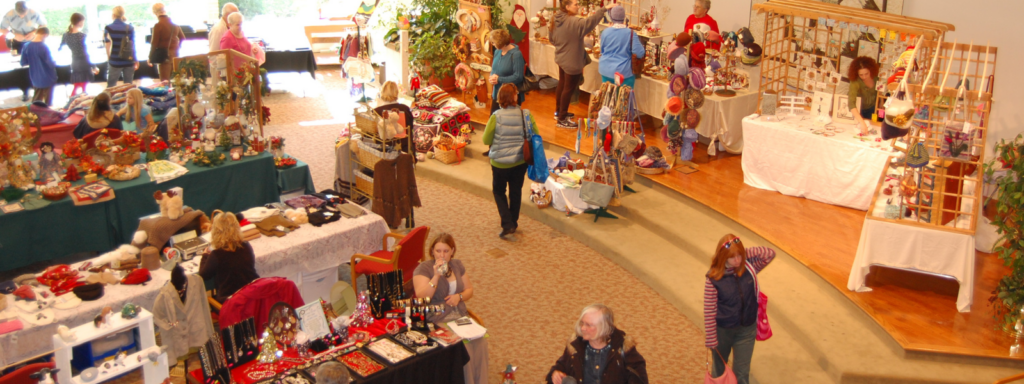
The Holiday Bazaar
Like the Chicken BBQ, the annual Holiday Bazaar – a two-day market featuring local crafters, artists, and other vendors – grew from a humble start in 1975 into a popular tradition.
“It used to be where the laundry is located now,” Alta recalled. “I would bring my grandparents, who were residents at the time, down that long hallway. It was small, but people came.”
The bazaar was originally called the Pre-Christmas Sale and took place after Thanksgiving until flagging attendance prompted a shift to early November. It “really took off” after that, according to Alta.
One of the most popular elements – the oyster stew, first introduced in 1981 – was another contribution of Florence Metz.
“We would also make vegetable soup in the kitchen, working until late at night,” Alta said. “Cooling it down was always an issue. It was quite an undertaking!”
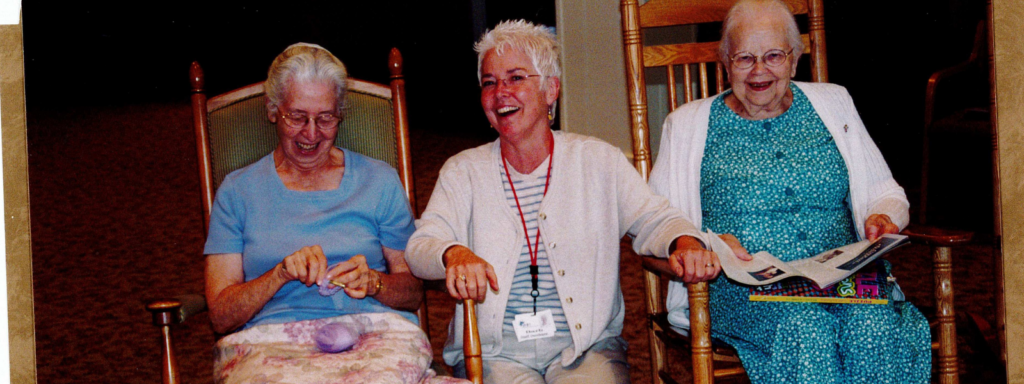
Rocker-thon
When Souderton Mennonite Homes sought to build a fitness center, the Auxiliary came up with a creative fundraiser: the Rocker-thon, first hosted in 2004.
“The first year, we had bikes in the auditorium, and people sat on those instead of rocking chairs,” Alta recalled.
The event quickly evolved into its current state, in which residents enjoy knitting, word puzzles, and socializing while sitting in rocking chairs. Their friends and family members pledge support of the six-hour event, which is set to resume in 2024.
“It’s always fun to see how residents start in the center of the auditorium and end up on the outskirts because their rockers move throughout the day,” Alta said with a smile.
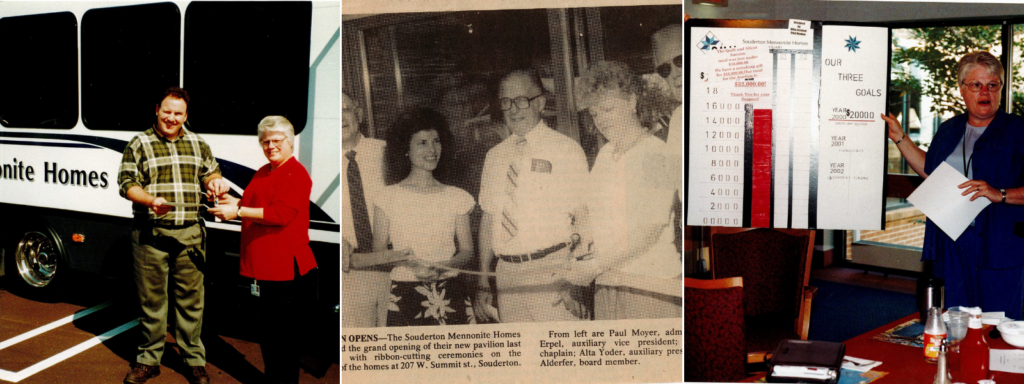
A Charitable Legacy
As the Auxiliary launched more and more annual fundraisers – and those fundraisers grew in size and success – they were able to fund larger projects and purchases. Those contributions now total over $2 million, a figure Alta calls “overwhelming.”
“I have trouble saying it,” she says.
Much of those funds supported campus projects, from the pavilion installed in 1987 to a new wheelchair van and two passenger vehicles in the late 1990s, to the creation of the Apple Orchard Café in 2003.
Other times, funds were used for maintenance and refurbishments, including new air conditioning and fans in 1980 and work on the front lobby nearly 13 years later. For several years in the early 2000s, matching gifts doubled the impact of these contributions, helping to establish the Apple Orchard Café and bring new equipment to the fitness center.
“For every project, someone in the Auxiliary was really on top of it,” Alta explained.
Supporting Benevolent Care
When Living Branches was established in 2008 through the affiliation of Souderton Mennonite Homes and Dock Woods, the Auxiliary shifted the focus of their donations.
Since 2007, the Auxiliary has contributed nearly $575,000 to the Agape Fund, which provides benevolent care to Souderton Mennonite Homes residents who can no longer afford the full cost of their care.
Some of these funds come from the Corner Store at Souderton Mennonite Homes, another creative avenue for fundraising that opened its doors in 1985. Those who run the store volunteer their time to ensure the store’s profits benefit residents.
Auxiliary funds also come from community members and businesses who give financial support.
“Everyone comes together to help those who can’t afford care for the length of years they live anymore,” Alta says. “I think we’re more focused now, and donors are more enthused with that.”
Dollars raised for the Agape Fund broaden the impact of the Auxiliary’s work, as all residents who qualify for benevolent care can benefit from the fund. In 2023 alone, 18 Souderton Mennonite Homes residents received benevolent care thanks in part to the Agape Fund.
“Senior citizens have always been my love,” Alta says. “As a senior myself, I know how families feel. They’re just so grateful for a program that will take care of them like this.”

